- Home
- Juliet Marillier
The Well of Shades Page 3
The Well of Shades Read online
Page 3
He had by then formed a profound desire to quit the shores of our homeland and not to look back. From the Dalriadan king, Gabhran, he had obtained a promise of a haven: an island known as Ioua, off the western shores of the Gaelic part of Fortriu, on which he might settle with a small band of brethren and found a monastic center. It would be a new land: a new beginning, where a life of simplicity and obedience might be lived free from the dark cloak of the past. Before them lay a realm in which the light of Our Lord had barely begun to shine: Fortriu, heartland of the Priteni.
As it fell out, I found myself called away from home once again, this time to serve as translator and spiritual adviser at King Gabhran’s court. Colm approved the venture, saying it could only benefit our cause for me to have the king’s ear and keep him mindful of his promise. So I traveled to the Gaelic territory of Dalriada, in the west of Priteni lands. No sooner had I arrived than the tide turned. Fortriu moved on Dalriada. Bridei’s tactics were brilliant; even a man of limited military knowledge, such as I am, could see his flair. The advance took place far earlier than anyone expected. It was on a grand scale, with a multitude of separate forces converging by land and sea on our countrymen and almost annihilating Gabhran’s army. Nobody had believed Bridei of Fortriu could do it without the support of Circinn, the southern counterpart of his own country; but he did. To me it was less surprising. From the first I saw something exceptional in Bridei. Whether that quality can be exercised for pursuits other than war is still to be proven, but I believe it can. Whether that passionate faith will ever veer from the ancient gods of the Priteni, those in whose laws Bridei has been steadfastly nurtured from infancy by his mentor, Broichan, remains to be seen. That is a higher mountain to climb.
So, Dalriada is lost to the Gaels, for now at least, though our presence remains; folk do not inhabit a land for three generations to be entirely cast out, not when the conqueror is as just and wise a man as this young king of the Priteni. Gabhran is a prisoner within his own fortress at Dunadd, and his territories now fall under Priteni chieftains, all answerable to King Bridei. But those communities, those outposts and villages are full of a new folk, bred of both Gaelic and Priteni blood. And, for all Bridei banned the practice of the Christian faith in Dalriada, it still goes on in lonely cave or on windswept island, in smithy or barn or on the deck of a small boat plying the choppy waters of the west in search of codfish. As they spin and weave, women sing of Mary, Mother of God. The Lord’s flame flickers; the coming of this man we call Colmcille will fan it to a great blaze.
We have not yet sailed. Gabhran promised a sanctuary, but it is no longer his to give. Bridei told me once that I am everywhere. Not possible, of course; but the skills God has granted me have certainly led to extensive travel. I was there when Bridei became king of Fortriu. I was present when Gabhran ceded the kingship of Dalriada and Bridei pronounced sentence of banishment, a sentence commuted to a period of incarceration in recognition of the Dalriadan king’s poor health. On that field of war, with the Gaelic dead lying in their blood, I spoke of Colm and of his mission. I spoke of the place called Ioua, Yew Tree Isle, and of the making of a promise. Bridei heard me and understood. I believe his messenger will seek us out.
We wait, meanwhile; winter is coming, but in spring God will send us a fair wind and a fortunate tide. Colm will not give up the promise of a haven in that realm, even though the one who gave it no longer has the power to grant us our island. We will sail for the Priteni shores regardless of that; if need be, Colm will petition Bridei to grant us the land. In doing so he will be swimming against a mighty current, for the taking of Dalriada has shown Bridei of Fortriu to be a leader of immense power, and I know he is devout in his adherence to the old faith of his people. I believe the meeting of these two men will be extraordinary.
SUIBNE, MONK OF DERRY
AT WHITE HILL, it was raining. The days had grown short, dusk settling early over the high walls and orderly stone buildings of King Bridei’s hilltop fortress. The gardens were drenched. Water gurgled busily into drains and, below the walls, the stream coursed brimful down the pine-clad slopes of the hill.
Derelei had spent the afternoon with Broichan, making boats from twigs and leaves and sailing them on the pond. Observing from a distance, Tuala had noted the capacity of each of them, infant and druid, to maintain a dry area around himself no matter how heavy the downpour. She’d seen also how the small craft moved, pursuing-one another, making a steady course without need of wind or oar, in a game of maneuvering that owed far more to the art of magic than to luck or physical skill. She hoped Broichan would remember how young her son was and that, for all his exceptional talents, Derelei tired easily. As for the druid himself, his health was much improved since his sojourn among the healers of Banmerren, but Tuala knew he was not infallible. He, too, needed to husband his strength.
Derelei was indoors now, eating his supper in company with his nursemaid. Today his small vocabulary had been augmented by a new word, boat.
It was time, Tuala had decided, to broach a particularly delicate subject with the king’s druid. She had avoided it up till now, lacking the courage to confront the man she had feared since childhood, when he had bent all his considerable will on ensuring she and his foster son did not form too strong a bond. As a child of the Good Folk, Tuala was an unlikely wife for a king of Fortriu. If Broichan had had his way, Bridei would have wed a far more suitable girl, someone like Ana of the Light Isles, for instance. Tuala and Bridei, between them, had won that battle and in time Broichan had become almost a friend to her. He had saved Derelei’s life when fever nearly took him. Tuala had helped Broichan battle his own long illness. She had agreed to let him tutor her gifted son. Now, with a second child expected and Bridei away seeing to a matter at Abertornie, it was time to confront Broichan with an event in his past. She did not expect him to welcome it.
For a long time Tuala had struggled with the mystery of her identity in silence. She might never have acted on what little she had discovered if she had not observed her son’s talent developing in all its confident precocity. She had seen Broichan watching Derelei; seen the watchful love in the druid’s eyes. If what she believed was true, the two of them should know it, Broichan now, her son when he grew older. There were some painful truths, Tuala thought, whose importance was such that they must be exposed to the light.
She willed herself calm as she made her way to the druid’s private chamber. Even now her heart thumped and her palms grew clammy at the prospect of raising such a matter with her old adversary. What if she was wrong? This was conjecture, after all, based on her own interpretation of a vision in the scrying bowl. One of her very first lessons at Banmerren, the school for wise women, had been how deceptive such images could be and how easily misinterpreted. The gods used them to tease and to test, and the seer walked a narrow path between giving good counsel or ill.
Tuala used her skill rarely; there were those who would seize any opportunity to point out the strangeness of her origins, seeking thus to weaken the foundations of her husband’s kingship. For a while she had not used her craft at all. She had come to it again after a vision of hers helped save Bridei’s life at the time of the great battle for Dalriada. She had known then that the risk was worth it. Today she planned to scry again.
She knocked. Broichan opened the door, showing no sign of surprise when he saw who it was.
“I need to speak to you in private,” Tuala said. “If you will.”
“Of course, Tuala. Come in.”
She thought perhaps she had interrupted him in prayer, for two candles burned on a shelf and before them a thin mat was laid on the stone floor, a small concession to his illness. The chamber was orderly. Shelves were neatly packed with the accouterments of his calling; an oak table held a jug of water and a single cup. From the rafters hung plaits of garlic and bundles of healing herbs. His scrying mirror was nowhere to be seen.
“Please sit. You wish to discuss Derelei’s progress? His we
lfare?”
“Not today. I see that he is doing well, though he does get very tired. I have a difficult matter to set before you, Broichan. You may have some idea what it is; I’ve heard Fola refer to it once or twice, obliquely.”
Broichan waited, a tall figure, dark-robed. His hair was more gray than black now and fell in a multitude of small plaits across his shoulders. In the candlelight the moon-disc, a circle of pale bone he wore on a cord around his neck in tribute to the Shining One, gleamed softly. His deep-set eyes gave nothing away.
“It would be easier for me to show you this in the water of a scrying vessel,” Tuala told him. “I feel a certain reluctance to put it straight into words; I’m afraid it will offend you.”
“If you wish.” His voice was at its most constrained. Tuala suspected he knew what was coming. “You are confident you can summon what you need and reveal it in one form to the two of us? That’s a prodigiously difficult task, Tuala.”
Not for me. “If the Shining One wishes us to see this, we will see it. Have you a bowl we can use?”
He fetched a vessel without further comment, uncovered it, and poured water from a ewer. “You prefer this to the mirror,” he said. It was not a question.
Tuala nodded, not speaking. Already the water called her, too powerful to resist. She stood, and Broichan, opposite, reached over to take her hands. They faced each other across the bowl. Tuala felt his hands, strong and bony, relax in hers as he looked down. He was expert in the seer’s art, as in all branches of magic. He knew without the need for telling that, in order to grant Tuala control over the vision, he must submit his formidable will to hers. And indeed, for all his long years of training and discipline, it was she, the child of the Good Folk, who had the greater facility in this branch of the craft. Perhaps it was not so surprising that some folk distrusted her.
The water rippled, shimmered, and was still. The vision came: the same Tuala had seen once before. That first time neither Broichan nor the wise woman Fola, both of whom had been in attendance, had discerned it. Now she felt Broichan start. His hands gripped tightly for a moment, then relaxed again as he forced his body to obey his will.
In the water a younger Broichan, clad in a white robe, walked a forest path in springtime. Another figure shadowed him, a slight, lovely woman whose fey eyes and milk-pale skin marked her out as one of the Good Folk, that diverse band of Otherworld people who inhabited the woodlands of the Great Glen and beyond. This person was one of Tuala’s own kind, akin to the two beings who had shown themselves to her in her childhood, interfering in her life and Bridei’s, tempting her with promises to reveal her true identity and always holding that knowledge back. She knew only that she’d been a foundling, an abandoned infant. If she had parents, they had never come forward to claim her, not in all the nineteen years since they had left her on Broichan’s doorstep.
In the water, the white-clad druid looked around; he had sensed he was not alone. A voice seemed to speak, though in the candlelit chamber where Broichan and Tuala stood all was silent. Come, my son. Come and honor me. And, when the younger Broichan hesitated, suddenly very still on the sunlit path amid the dappled greens and golds of the springtime forest, Come, faithful one. I require this of you.
Tuala did not doubt that the goddess spoke. The fey woman was only a messenger. Perhaps, for this one day, she was an avatar: the earthly embodiment of the Shining One, whose own presence was ever veiled in the daylight. The white-clad druid saw the woman. His face paled and his jaw tightened. Obedient he might be, but this was plainly difficult for him. The woman smiled. She was beguiling, her lips full and rosy, her slender figure shapely and enticing beneath the sheer fabric of her floating gown. She reached out a hand toward the druid.
Go, my son. The voice again, not that of this charming creature but a deep, strong one that made every tree in the wildwood shiver. I call you to my service. Do you hesitate?
The druid took the proffered hand in his. Tuala could feel his reluctance and, along with it, the coursing pull of physical desire in his body. It was customary for his kind to perform a solitary three-day vigil to mark the festival of Balance, when day and night were equal and spring stirred even in the north. If the Shining One required of a believer, at such a time, a devotion expressed with the body rather than the mind, how could a faithful man hold back? If such an act felt wanton, abhorrent, lacking in self-control, he must still perform it, for at the heart of spiritual practice was the love of god and goddess, Flamekeeper and Shining One, and perfect obedience to their will. Indeed, he must exercise mind and body to perform it in a spirit of good faith, for to practice a rite reluctantly was to cause the goddess most bitter offense.
The woman stepped closer. Her free hand slipped down to touch the front of the white robe, between the druid’s legs; if he was shy, she most certainly was not. Caught as she was in the vision, Tuala found herself sufficiently aware of the here and now to hope profoundly that the goddess would draw a veil over what was to come. She had called this up to illustrate her theory to Broichan, not to embarrass and shame him.
The water swirled; the image broke up into brief glimpses, snatches of sight: here a white hand on the plane of thigh or back or chest; here a sensuous mouth, lips parted, tongue moving to lap and lick, to taste and tease; here muscular buttocks clenching and unclenching; here long fingers stroking, playing, clearly not fettered by lack of experience. They were in a grove. They lay on the druid’s white robe, which was spread in a grassy hollow. The woman’s gown hung from a willow branch, its gauzy fabric as insubstantial as cobweb. Their bodies moved, at first slowly, with sensuous delight in every moment of their concourse, then more quickly as urgency overtook them, until their hearts surely shared the same desperate drumbeat. It was the oldest dance of all, beautiful, powerful, over all too quickly, leaving forest woman and druid lying together on the grass-stained linen, bodies sheened with sweat, chests rising and falling fast as the pounding heartbeat slowed and the fierce breath calmed. A cloud darkened the sun; a shadow passed over the little grove. The vision dissipated and was gone.
Broichan drew his hands away from Tuala’s. There was a silence as each returned slowly to the shadowy chamber. A practiced seer allowed such a vision to release its hold gradually. To hasten the process led to dizziness, nausea, and distress. Tuala blinked, moving her fingers, stretching her arms. Broichan reached for the dark cloth that had lain on a shelf beside the scrying bowl and draped it over to conceal the water. When he spoke, his voice was tight with constraint and decidedly chilly.
“I cannot imagine why you would wish to view such images in my company,” he said. “This was unseemly. Distasteful. I had thought us almost friends, Tuala. I had come to believe we trusted each other; to think my first assessment of you, long ago, was incorrect. I believed you dangerous: to me, to Bridei, to all you touched. This makes me suspect I was right.”
Tuala felt his words like a blow. For a moment she could not speak. Then she reminded herself that she was queen of Fortriu and that, as Derelei’s mother and Bridei’s wife, she had power over the king’s druid whether he liked it or not. It didn’t help much; she was amazed at how her heart shrank before his repudiation.
“Please go now,” Broichan said, walking to the door and holding it open.
“If that is your preference, of course. I’ll ask you a question first.”
He waited, eyes cold and remote.
“I don’t imagine such events occur often. Very likely, a man experiences them only once in his life, and therefore may have an excellent recall of when they happened. I must tell you that when I saw this before, the vision was far briefer; I did not expect such… I did not call this up to shame you, Broichan. The goddess showed far more than I anticipated.”
“Please leave now, Tuala.”
“It was springtime, wasn’t it, at the feast of Balance? Was that the spring before my own arrival at Pitnochie? Was the winter after those events the one when unknown hands delivered me to
your doorstep as a newborn babe?”
“I will not discuss this.” His voice was hard as iron. “I will answer no questions.”
“There’s no need to answer them,” said Tuala, walking past him and out into the passageway. “All I request is that you give them consideration. The idea must have occurred to you. Or is the possibility that I might be your daughter so painful to contemplate that you have closed your mind to it and thrown away the key?”
He shut the door in her face. Tuala stood outside, working on her breathing, willing back tears, slowing the painful thudding of her heart. She had known Broichan a long time. Part of her had anticipated this rejection, this refusal to acknowledge any error. And yet, the wave of sorrow that swept through her was so profound that for long moments it paralyzed her there on his doorstep. Her father. Her own father. How wonderful it would have been if he had offered a little, a wary trust, a tentative recognition of that bond. She realized that, in her heart, she had hoped for more: an embrace; words of affection; perhaps a guarded apology. That had been foolish. Even if he had been prepared to acknowledge the possibility of blood kinship, the closest Broichan ever came to an expression of feelings was a wintry smile or approving nod of the head. Only with Bridei, his foster son, had he ever come close to revealing what was in his heart. And with Derelei because, after all, Derelei was Bridei’s son.
She had wanted to ask, Does it mean nothing to you that this would make you Derelei’s blood kin? That the infant mage whose rare talents you nurture with all your skill might be your own grandson? Do you not long to acknowledge him? How could she say those things when she herself stood in the way? The thought of her as a daughter was abhorrent to him. That had been in his affronted eyes; it had been in the tight distaste of his tone. He would never tell the truth about this. He would never accept it. Apart from his deep distrust of her, which had existed since the moment he first set eyes on her as a tiny babe, to acknowledge her as his daughter was to admit shutting his own kin out for all the years of her growing up. He had provided her with food and shelter. At the same time, he had made no secret of his hostility toward her. To admit the truth was to recognize the greatest error of his life: an unforgivable insult to the Shining One. And is not a druid’s whole existence bent to the goddess’s service? Dashing the tears from her cheeks, Tuala forced herself to walk away. Maybe her own father did not want her, but she was still queen of Fortriu, and there were things to do.

 Den of Wolves
Den of Wolves Flame of Sevenwaters
Flame of Sevenwaters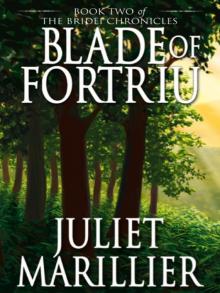 Blade of Fortriu
Blade of Fortriu Wildwood Dancing
Wildwood Dancing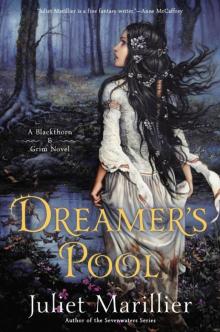 Dreamer's Pool
Dreamer's Pool Raven Flight
Raven Flight Heir to Sevenwaters
Heir to Sevenwaters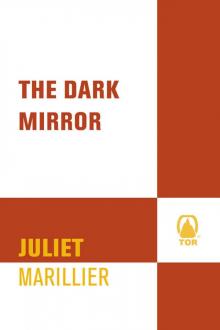 The Dark Mirror
The Dark Mirror Daughter of the Forest
Daughter of the Forest Seer of Sevenwaters
Seer of Sevenwaters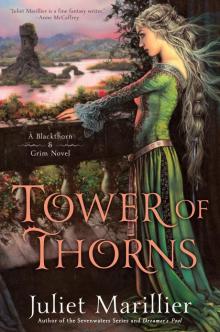 Tower of Thorns
Tower of Thorns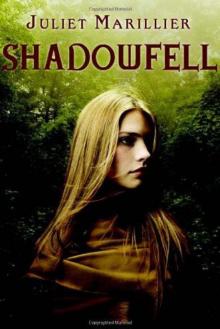 Shadowfell
Shadowfell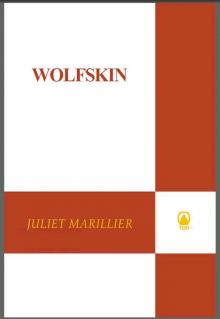 Wolfskin
Wolfskin The Caller
The Caller Foxmask
Foxmask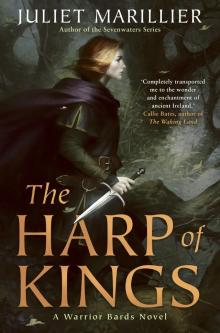 Harp of Kings
Harp of Kings The Well of Shades
The Well of Shades Heart's Blood
Heart's Blood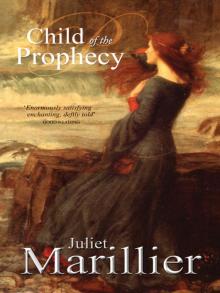 Child of the Prophecy
Child of the Prophecy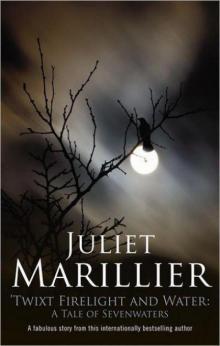 Twixt Firelight and Water
Twixt Firelight and Water A Dance with Fate
A Dance with Fate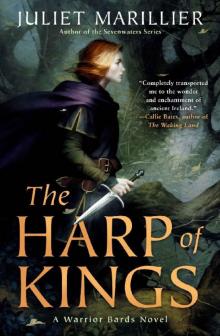 The Harp of Kings (Warrior Bards)
The Harp of Kings (Warrior Bards)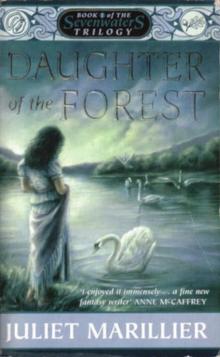 Daughter of the Forest (The Sevenwaters Trilogy)
Daughter of the Forest (The Sevenwaters Trilogy)![Sevenwaters [06] Flame of Sevenwaters Read online](http://i1.bookreadfree.com/i2/04/08/sevenwaters_06_flame_of_sevenwaters_preview.jpg) Sevenwaters [06] Flame of Sevenwaters
Sevenwaters [06] Flame of Sevenwaters![[Sevenwaters 04] Heir to Sevenwaters Read online](http://i1.bookreadfree.com/i2/04/12/sevenwaters_04_heir_to_sevenwaters_preview.jpg) [Sevenwaters 04] Heir to Sevenwaters
[Sevenwaters 04] Heir to Sevenwaters